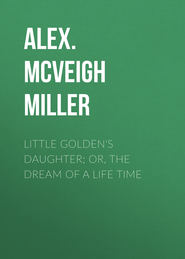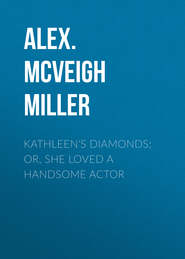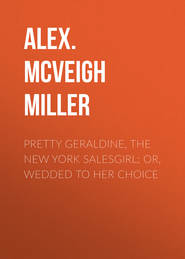По всем вопросам обращайтесь на: info@litportal.ru
(©) 2003-2024.
✖
Lancaster's Choice
Автор
Год написания книги
2018
Настройки чтения
Размер шрифта
Высота строк
Поля
"Hum! All the happiness you would have witnessed wouldn't have hurt you," ruefully. "And so you ran away like a coward! What have you been doing all this while, truant?"
"All sorts of foolish things, I'm afraid. For one thing, I've been trying to exchange out of my own regiment into one ordered to India."
Lieutenant De Vere was betrayed into a whistle of profound surprise:
"Whew!"
"Yes," admitted the big, handsome fellow, shamefacedly.
"But do you mean to tell me that you were going to throw over the whole thing, Lady Lancaster, Lady Adela, and all—just because you were disappointed in love?" queried De Vere, in wonder.
"Yes, I believe I was—though I didn't think much about it. You see, I was just running away headlong from my own misery."
"I did not really believe you were so romantic," said De Vere, after a long pause.
"You mean so foolish," said his friend, eying him closely.
"Well, perhaps so," admitted the lieutenant.
"A man must be far gone, indeed, to throw away twenty thousand a year and an earl's daughter for the beaux yeux of a pretty little penniless girl. Such luck is not met with every day."
"Leonora is worth it all," said Lancaster, warmly.
"Yes, if one could win her; but then you were throwing all away, without anything in return. You should have remembered that you would lose all and gain nothing. What says the poet:
"'What care I how fair she be,
If she be not fair for me?'"
Lancaster said nothing, only sighed furiously.
"Look here, old fellow," said his friend. "Tell me the truth. If you could get Leonora, would you really throw over all the rest for her? Would you do the 'all for love, and the world well lost' business?"
An eloquent look from Lancaster's dark-blue eyes was his only answer.
"You would. Then you are far gone indeed. I do not think I ought to countenance you in such egregious folly. I think you will be cured of your madness when I tell you her second reason for not loving me."
Lancaster looked at him imploringly.
"Say what you are going to say, De Vere," he said, almost roughly, in the misery that filled his voice; "but, for God's sake, don't chaff! Think what I've endured already. I love Leonora to madness. If you think there's any hope for me, say so at once and put me out of misery."
"Lancaster, I'm sorry for you, upon my soul, but I don't think there's any chance for you at all. Miss West told me quite frankly that she was in love with another man."
Lancaster gives a great start. He says, hurriedly:
"Who is the happy man?"
"She would not tell, but of course it can not be you, because she says it is quite a hopeless passion. He does not love her; she admitted that with the reddest blushes."
"No, of course, it can not be me, for I am quite sure she knows my heart. I have shown her my love unwittingly more than once, and been laughed at for my pains," Lancaster admits, with bitter chagrin and despair struggling in his voice.
"Poor little girl! It is strange that she should love in vain. It is a cold-hearted man indeed that could be insensible to so much beauty and sweetness," De Vere muses aloud. "I think it is some one she has left in New York, for she and Miss West are going to sail for America next week, to make their home there."
"Then that ends all," Lancaster says, moodily.
"Yes," De Vere answers, rather gravely. "And there will be one page folded down forever in both our lives, eh, old fellow? We are in the same boat, you see. But take my advice, Lancaster, don't let this episode spoil your prospects. Throw up the India scheme, and go home and marry the earl's daughter."
CHAPTER XXXVIII
Lady Lancaster was surprised and angry and frightened all in one when she heard that Leonora West had refused Lieutenant De Vere. She made him own the truth when he came to make his hasty adieus, and she roundly abused the "pert minx," as she called her, for her "impertinence and presumption."
"Whom does she think she will get? Does she think she will capture an earl or a duke?" she sneered, and De Vere answered, coldly:
"I do not believe that she has any matrimonial designs on any one, Lady Lancaster. She returns to America in a very few days."
Lady Lancaster was so surprised that she gave vent to her relief in a hasty exclamation:
"Thank Heaven! And I devoutly wish that she had remained there."
"There are more persons than one who will agree with your ladyship there," he said, betrayed into a laugh at her naïveté.
"Whom?" she exclaimed, with a start.
"Myself for one," he answered. "I am not at liberty to implicate any one else."
She gave him a savage glance.
"Do you mean my nephew?" she inquired.
"I said I was not at liberty to name any one else," he replied.
Then he went away, and Lady Lancaster straightway confided the fact of his rejection to all the ladies in the house. They all agreed with her that Leonora West was an impertinent minx to have refused such a splendid offer, but that it was a narrow escape for Lieutenant De Vere and that he had need to be very thankful over it.
In the meantime, Lady Lancaster's guests grew very curious over her nephew's absence. The earl and his daughter talked of going away. They felt secretly aggrieved and resentful over Lord Lancaster's continued absence. It was a palpable slight to them. They did not believe the story of important business in London.
What business could he have?
Lady Lancaster wrote her nephew a sharp, imperative letter of recall. She was on thorns lest her long-cherished scheme should fail. She intimated quite plainly that her patience was exhausted, and that if he did not come to terms soon she would never forgive him, and worse still, she would cut him out of her will.
Lancaster threw that letter angrily into the fire, and swore to himself that he would not go near Lancaster. He would go off to India, and she might buy another husband for her favorite with the money she prized so much. He would have none of it.
In short, our hero was in a most sullen and intractable mood. His heart was sorely wounded, for he had loved Leonora with all the strength and passion of a noble nature. His sorrow for a time completely mastered him. He said to himself that he could not bear to go back now. He must wait a little longer.
Then came De Vere with his strange story. Now indeed all was ended, thought the hopeless lover. She was going away, and he would never even see her again, this bright-eyed, soft-voiced girl who had stolen into his heart almost unawares, who had been so cruel to him, who had so lightly scorned him, and yet whom he loved with all the strong passion of his young manhood.
Once or twice De Vere reiterated his advice that he should go home and marry Lady Adela, but Lancaster only laughed miserably in his face.
"What, with my heart and soul full of another woman?" he said, bitterly. "No, I can not do that much injustice to beautiful Lady Adela. I respect her too much."











